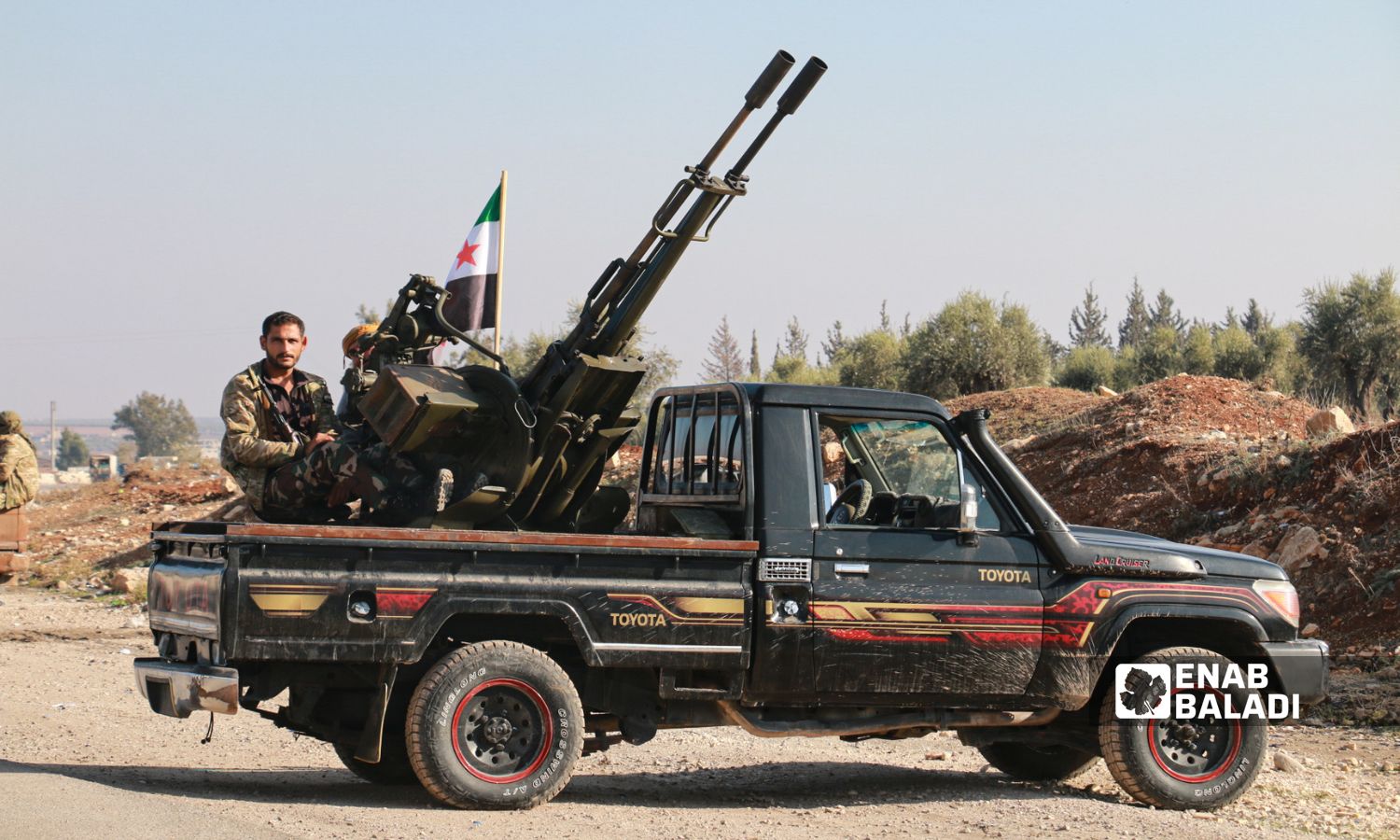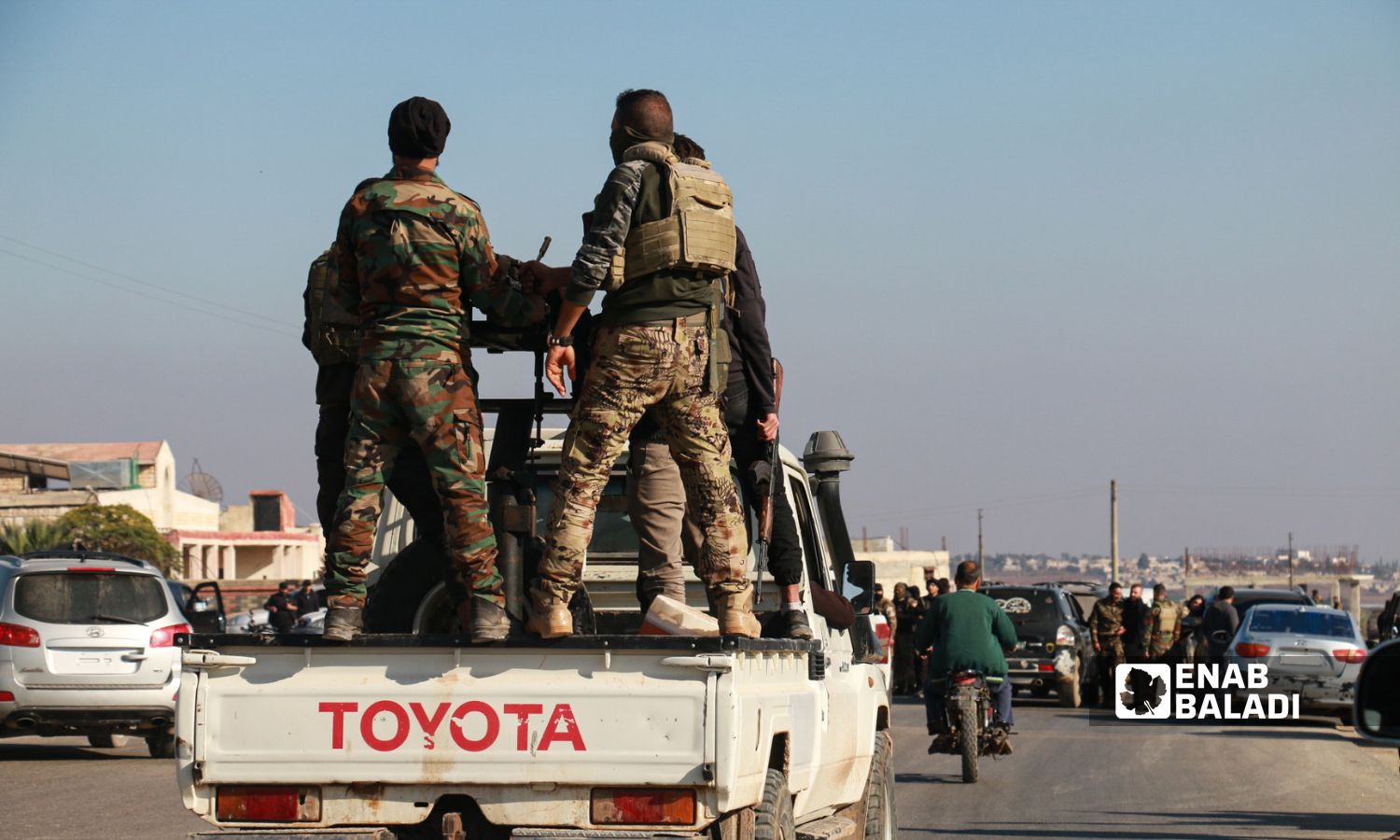



Enab Baladi – Aleppo countryside
“The majority of the fighters work in daily jobs and professions, as the salary is only sufficient for a week or less,” Majed, one of the fighters of the Turkish-backed Syrian National Army (SNA), justifies the fact that most of the fighters resort to daily wage jobs in addition to military work.
Along with tens of thousands of other personnel, Majed (pseudonym) says he is waiting for the salary increase promised by the Ministry of Defense in the Syrian Interim Government (SIG), the political umbrella of the Syrian National Army, amid promises that have been repeated over the years, and an unjustified discrepancy between the salaries of one faction and not the other, and a different life led by the leaders.
The SNA members suffer from difficult living conditions, as is the case with residents in northern Syria, and there is no fixed number for them.
The Syrian National Coalition said that their number was 80,000 fighters in 2019, while a report by the Middle East Institute (MEI) reported last October that the formation gathered between 50,000 and 70,000 fighters.
Majed, who operates in the ranks of the Third Legion, receives a monthly salary of 600 Turkish liras (about 32 US dollars) in addition to 200 TL in allowance, which he receives from the battalion commander. The salaries of administrators start from 1,200 TL and reach up to 3000 TL, based on tasks and specialization.
The salaries of SNA fighters differ from one faction to another and from one position to another as well, and the way they are delivered either through the battalion or group commander or by hand delivery at the headquarters.
Salaries are delivered from the Turkish side to the operations room in the village of Hawar Kilis in the northern countryside of Aleppo. The room includes SNA commanders, and it works in coordination with the Turkish forces.
Omar, who operates in the Sultan Suleiman Shah Division (known as al-Amshat) key unit in the Second Legion, told Enab Baladi that he gets 1000 TL per month as the salaries vary according to each battalion, the number of days the fighter serves and his duties.
The lowest salary a soldier can receive is 400 TL, according to what Mohammad, who is also a fighter in the ranks of the Second Legion, said, pointing out that salaries are always late and the delivery period sometimes extends to two months.
The father of three children receives 600 TL a month, such a salary that is only enough for a few days.
Most of the SNA fighters are obliged to work overtime in the professions they worked in before joining the National Army, such as construction, carpentry, blacksmithing, agriculture, and others, outside their shift days or their commitment to their military duties, according to Mohammad.
The SNA members are awaiting what the Ministry of Defense in the Interim Government announced about its intention to raise the value of the allowance provided to all fighters and workers in the National Army and its security forces, with the aim of improving their living conditions.
The ministry stated on 9 November that the allowance would be delivered regularly on a monthly basis.

Fighters from the Third Legion, key unit in the Turkish-backed Syrian National Army, on the Azaz-Afrin road near the town of Kafr Jannah in the northern countryside of Aleppo – 20 November 2022 (Enab Baladi/Dayan Junpaz)
According to the three fighters that Enab Baladi spoke to, bonuses or allowances are rarely given to the SNA members except for some fighters who have strong ties with the commanders at a time when the salaries of some leaders reach many times the salary of regular fighters.
The complaint of the SNA members about their poor and insufficient salaries is not new, but it is repeated with every rise in prices amid a deteriorating living reality in the opposition-held northern Syria.
Some of the SNA commanders also have been criticized for the life of “opulence and luxury” they lead is not comparable to the life of fighters.
With every circulation of the SNA commanders’ meetings on social media, accusations arise against them, and their military councils are criticized for “imitating the manifestations of the Syrian regime,” as they are not taking into account the needs of the members of their factions.
It is also accompanied by demands to spend money on the elements and increase their salaries, especially the fighters on the engagement points, and not to waste it on building headquarters or military councils.
An investigation conducted by the human rights organization Syrians for Truth and Justice (STJ) last June revealed the various financial sources on which the “al-Amshat” fraction depends to finance itself in the border Afrin region, north of Aleppo.
The methods and people that the faction leader, Mohammed al-Jassem “Abu Amsha,” relied on and the methods of illegal financial gain were also revealed.
The legal organization said that the annual income of “Abu Amsha” amounts to more than 30 million US dollars.
This is done through several “illegal” ways to gain it, most notably his reliance on his five brothers by handing them senior positions in the faction and authorizing them to manage his projects and investments in Syria, Turkey, and Libya.
The extravagant appearance of Walid al-Khuwaylid, the son of Adnan al-Khuwaylid, commander of the Brigade of Glory (Brigade 211), sparked widespread discontent and controversy on social media last February, as he showed off his horseback riding in the countryside of Aleppo accompanied by luxury cars and an armed personal escort, showing off his skills in using various weapons and shooting with light and heavy weapons.
The footage left great anger and wild criticisms amid calls for accountability for the commander of the “Izza Brigade” (Brigade 211), which is affiliated with the Sultan Murad Division.
Previously, members of the National Army demonstrated to demand an increase in their salaries and not delay them in many cities and towns in northern Syria.
In April 2021, the city of al-Bab in the eastern countryside of Aleppo witnessed a demonstration by some militants due to the delay in receiving their salaries, which some of them considered, in an interview with Enab Baladi, “not enough money for a son of any SNA commander or for a lunch feast.”
The National Army controls the northern and eastern countryside of Aleppo, in addition to the towns of Ras al-Ain, northwest of al-Hasakah, and Tal Abyad, north of Raqqa.
The Turkish-backed army has been witnessing the merger and defection of several military formations under its mantle, and a state of factionalism is taking shape with multiple names, despite the recent attempts of the Interim Government’s Defense Ministry to unite these factions and activate the role of military institutions.
Enab Baladi’s correspondents, in Azaz, Dayan Junpaz, and in Afrin, Amir Kharboutli, contributed to this report.
if you think the article contain wrong information or you have additional details Send Correction